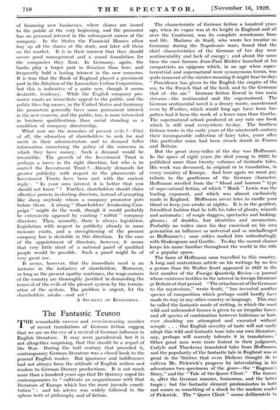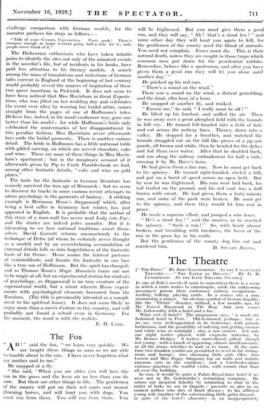The Fantastic Teuton
THE remarkable success and ever-increasing number of recent translations of German fiction suggest that we are on the eve of a revival of German influence in English literature. It may seem pi-radoxical, but it is not altogether surprising, that this should be a sequel of the War. During the half century that preceded it, contemporary German literature was a closed book to the general English reader. But ignorance and indifference had not always been the attitude of English writers and readers to German literary productions. It is not much more than a hundred years ago that De Quincey urged his contemporaries to " cultivate an acquaintance with that literature of Europe which has the most juvenile consti- tution " ; and his advice was widely followed in the sphere both of philosophy and of fiction. The characteristic of German fiction a hundred years ago, when its vogue was at its height in England and all over the Continent, was its complete remoteness from real life. .Madame de Stag, who wrote her treatise on Germany during the Napoleonic wars, found that the chief characteristics of the German of her day were sentimentality and lack of energy ; and about the same time the once famous Jean-Paul Richter launched at his compatriots an epigram which, in an age when super- terrestrial and supernatural were synonymous terms, was quite innocent of the sinister meaning it might bear to-day: " Providence has given to the English the empire of the sea, to the French that of the land, and to the Germans that of—the air." German fiction flowed in two main streams—the sentimental and the supernatural. The German sentimental novel is a dreary waste, unredeemed even by Werther, which would long ago have been for- gotten had it been the work of a lesser man than Goethe. The supernatural school produced at any rate one book which is still read everywhere to-day. The brothers Grimm wrote in the early years of the nineteenth century their incomparable collection of fairy tales, years after this particular muse had been struck dumb in France and Britain.
But the great story-teller of the day was Hoffmann. In the space of eight years (he died young in 1822) he published more than twenty volumes of fantastic tales. His work was devoured, in original or in translation, in every country of Europe. And here again we must pay tribute to the gentleness of the German character. Hoffmann recoiled from the " blood and horrors " type of supernatural fiction, of which " Monk " Lewis was the leading exponent, and which was almost exclusively made in England. Hoffmann never tries to curdle your blood or keep you awake at nights. It is in the gentlest, friendliest fashion that he tells his tales of ghosts, wizards and automata ; of magic daggers, spectacles and looking- glasses ; of doubles, lost identities and mesmerism. Probably no writer since his day exercised on his own generation an influence so universal and so unchallenged as Hoffmann's ; sane critics ranked him unhesitatingly with Shakespeare and Goethe. To-day the merest chance keeps his name familiar throughout the world in the title of a popular opera.
The fame of Hoffmann soon travelled to this country. A long and sententious article on his writings by no less a person than Sir Walter Scott appeared in 1827 in the first number of the Foreign Quarterly Review--a journal whose existence testifies to the interest in foreign literature in Britain at that period. " The attachment of the Germans to the mysterious," wrote Scott, " has invented another species of composition which perhaps could hardly have made its way in any other country or language. This may be called the fantastic mode of writing, in which the most wild and unbounded licence is given to an irregular fancy, and all species of combination however ludicrous or how- ever shocking are attempted and executed without scruple . . . Our English severity of taste will not easily adopt this wild and fantastic tone into our own literature, nay, perhaps will scarcely tolerate it in translations." Other great men were more lenient in their judgment, Carlyle and Thackeray translated tales from Hoffmann, and the popularity of the fantastic tale in England was so great in the 'thirties that even Dickens thought fit to enliven Mr. Pickwick's progress by intercalating in his adventures two specimens of the genre—the "Bagman's Story," and the " Tale of the Queer Client." The former is, after the German manner, humorous, and the latter tragic ; but the fantastic element predominates in both and comes as something 'of a shock to the modern reader of Pickwick. The " Queer Client " seems deliberately to challenge comparison with -German models, for the narrator prefaces his story as follows :— - "Talk of your German 'Universities. Pooh, pooh ! There's romance enough at hoine without going half a mile for it; only people never think of it."
The Dickensian enthusiasts who have taken infinite pains to identify the sites not only of the minutest events in the novelist's life, but of incidents in his books, have paid less attention to his literary models. A search among the mass of translations and imitations of German tales current in England at the beginning of last century would probably reveal the sources of inspiration of these two queer insertions in Pickwick. It does not seem to have been noticed that Miss Havisham in Great Expecta- tions, who was jilted on her wedding day and celebrates the event ever after by wearing her bridal attire, comes straight from the pages of one of Hoffmann's tales. Dickens has, indeed, in his usual exuberant way, gone one better than his model ; for while Hoffmann's bride only celebrated the anniversaries of her disappointment in this peculiar fashion, Miss Havisham never afterwards lays aside the bridal garments. There is another curious detail. The bride in Hoffmann has a little nutwood table with gilded carving, on. which are served chocolate, cake and wine. There arc none of these things in Miss Havis- ham's apartment ; but in the imaginary account of it afterwards given by Pip to Uncle Pumblechook we find, among other fantastic details, " cake and wine on gold plates."
The taste for the fantastic in German literature has scarcely survived the iron age of Bismarck ; but we seem to discover its tracks in some curious recent attempts to adorn psychology in the garments of fantasy. A striking example is Hermann Hesse's Steppenwolf which, after being a best seller in Germany last winter, has just appeared in English. It is probable that the author of this story. of a man-wolf has never read Lady into Foy ; and the stories are, indeed poles asunder. But it is interesting to see how national traditions assert them7 selves. David 'Garnett returns unconsciously to the technique of Defoe. (of whom he certainly never thought as a model) and by an overwhelming accumulation of external details lulls us into forgetfulness of the fantastic basis of his theme. . Hesse scorns thc faintest pretence of verisimilitude, and flaunts the fantastic in our face like a true son of Hoffmann. But the spirit has changed; and as Thomas Mann's Magic Mountain turns out not to be magic at all, but an experimental station for students of psychology, .so Steppentholf is no true creature of the supernatural world, but a retort wherein Hesse experi- merits with psychological elements borrowed from the Russians. (The title is presumably intended as a compli- ment. to his spiritual home). It does not seem likely to enjoy more than a success d'estime in this country, and will probably not found a school even in Germany. For the moment, the word is with the realists.
E. H. CARL









































 Previous page
Previous page